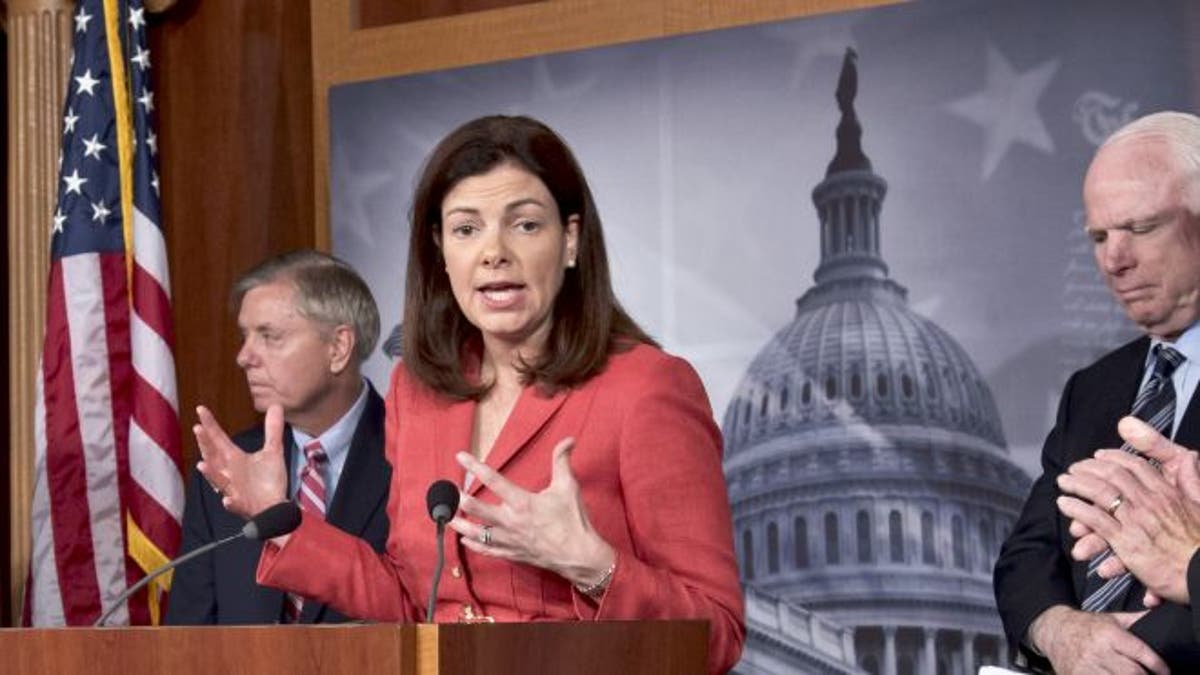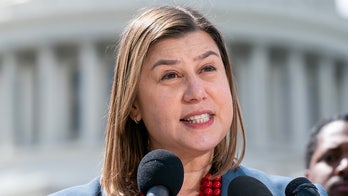
FILE: From right to left, Sen. John McCain, R-Ariz., Sen. Kelly Ayotte, R-N.H., and Sen. Lindsey Graham, R-S.C. (AP)
A bipartisan group of senators said Thursday they would pass legislation to impose new sanctions on Iran, and a key Republican introduced legislation that would limit President Obama's future negotiating ability with Tehran.
The 14 Republican and Democratic lawmakers said they would work together on crafting a set of new sanctions in the coming weeks. The president has personally appealed to senators to hold off on seeking new sanctions while negotiations on Iran's nuclear program are under way in Geneva.
“A nuclear weapons capable Iran presents a grave threat to the national security of the United States and its allies and we are committed to preventing Iran from acquiring this capability. We will work together to reconcile Democratic and Republican proposals over the coming weeks and to pass bipartisan Iran sanctions legislation as soon as possible,” the group said in a statement.
The senators signing the statement included Sens. John McCain, R-Ariz.; Robert Menendez, D-N.J.; Mark Kirk, R-Ill.; Charles Schumer, D-N.Y.; Lindsey Graham, R-S.C.; Ben Cardin, D-Md.; Marco Rubio, R-Fla.; Robert Casey, D-Pa.; John Cornyn, R-Texas; Chris Coons, D-Del.; Susan Collins, R-Maine; Richard Blumenthal, R-Conn.; Kelly Ayotte, R-N.H.; and Bob Corker, R-Tenn.
Corker, the GOP's top member of the Senate Foreign Relations Committee proposed a bill Thursday mapping out what a final agreement should look like and seeking to restrict Obama's capacity to offer sanctions relief.
“It’s important for the Senate to proceed with this debate and keep the pressure on Iran during negotiations over their illicit nuclear program,” Corker said in a statement. “Many of us have concerns that an interim agreement in Geneva will diminish U.S. leverage without Iran meeting its existing international obligations.
The legislation gives Obama 240 days to conclude the deal and says he can only suspend restrictions on Iran if he certifies that such action advances U.S. national security interests and that Iran is fully complying with existing agreements. It says any final agreement must compel Iran to end all uranium enrichment activity, a condition the Islamic republic has steadfastly rejected and one which U.S. negotiators have long conceded.
State Department spokeswoman Jen Psaki said no one would agree to a final pact that "does not address the big issues" of Iran's enriched uranium stockpiles and plutonium production and the need for greater inspections. But any indication right now that the United States isn't committed to diplomacy would be "unhelpful," she warned.
The GOP-led House passed additional sanctions against Iran in July and has been waiting for the Senate to act. But Obama up to now has convinced Senate Majority Leader Harry Reid and many other senators to hold off on new sanctions while world powers try to conclude an interim agreement with Iran.
Reid said Thursday that he backed the negotiations to curb Iran's nuclear program, but warned the Iranians could prevent any successful deal from emerging without the threat of new oil and financial penalties. He said the Senate must move forward with new sanctions after returning from a two-week recess next month.
"I will support a bill that would broaden the scope of our current petroleum sanctions, place limitations on trade with strategic sectors of the Iranian economy that support its nuclear ambitions, as well as pursue those who divert goods to Iran," Reid told fellow senators. "While I support the administration's diplomatic effort, I believe we need to leave our legislative options open to act on a new, bipartisan sanctions bill in December, shortly after we return."
The State Department's Psaki said she hoped Reid would give world powers "the space they need" for future negotiations as well. The administration says any new sanctions right now could scuttle the diplomatic effort.
An accord may be reached in Geneva in the coming days. It would provide Iran with $6 billion to $10 billion in sanctions relief if it agrees to suspend elements of its nuclear program, according to congressional aides. Tehran insists its program is for peaceful energy production and medical research purposes, while the U.S. and many other countries suspect it may be trying to develop atomic weapons.
The Associated Press contributed to this report.




